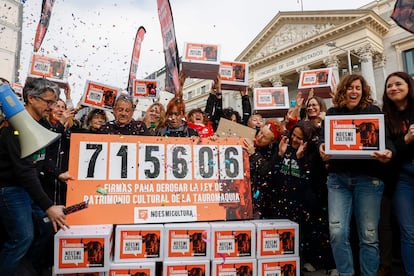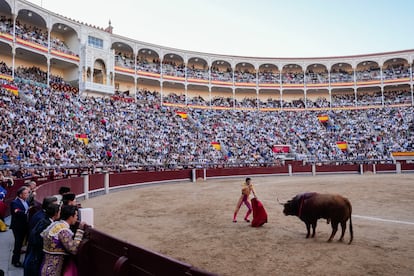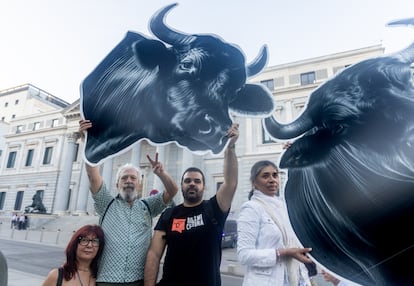Congress does not want to hear about canceling cultural protection to bullfights. Literally: the deputies have just knocked on the simple takes into consideration of a popular legislative initiative (ILP) that asked to withdraw the status of national heritage to bullfighting. The work of months of 3,000 volunteers was worth nothing, nor the 664,777 citizen firms that gathered to guarantee the proposal. His journey has shipwrecked before the first parliamentary stumbling block, with 57 votes in favor and 169 against. “Society is with us,” said the day before Aïda Gascón, a member of the Project Promoting Commission. It was not, however, the main party of the Government, the PSOE, whose doubts until the last hour finally bowed to an abstention that was decisive. “Culture is neither imposed nor repealed by decree,” said spokesman, Maribel García López, among other attempts for equidistance and balance of her intervention. In practice, it meant hurting the ILP. The bullfighting sector, vice versa, lived a big afternoon.
“The future is animalist,” Nahuel González, from the other party of the Executive, insisted yesterday, adding, which did support the ILP. The initiative, however, is already part of the past. He intended to repeal Law 18/2013 and cancel the status of bullfighting as National Cultural Heritage; And, incidentally, return to each autonomic power the option to maintain or veto its shows. The double defense, of animals and local competences, won the support of the entire left (Republican Esquerra de Catalunya, Bildu or Podemos) as well as of Catalan nationalism (Junts), Basque (PNV) or Galician (BNG). The PP, the extreme right of Vox and the union of the Navarrese people, with mention to the Sanfermines included. In the end, the ILP did not achieve either of its two goals. If perhaps, the opposite: bullfighting and his state armor came out reinforced from Congress.
It was clear, at the same time, that the matter generates a debate as complex as polarized and sensitive. More than celebrations, livestock, its labor or economic impact were talking about identity and tradition. When González, to add, said that “the so -called Toro Bravo is not a wild or danger of extinction, but a domesticated livestock breed created by the human being,” Vox deputy Joaquín Robles López interrupted him twice shouting. Only the call to the president of the president, Francina Armengol.
Some summoned Benito Pérez Galdós, Clara Campoamor, Unamuno or the anthropologist Jane Goodall, recently deceased, who wrote: “If it were a bull I would not want to be part of this show.” Others resorted to Picasso, Juan Belmonte, Manolete, Goya, Hemingway, Orson Welles or that famous definition of Lorca de la Bullfighting as “the most cultured party in the world.”
Etna Estrems Fayos, from Esquerra, offered another interpretation: “Seeing how an animal trapped and without the possibility of defense is not culture.” To which María Soledad Cruz-Guzmán García, of the PP, replied with a dedication to the hundreds of villages, municipalities and mayors by much of the Spanish geography held by bullfights. “No one can know the history of Spain if they do not know that of bullfights,” he added. And he took the opportunity to laugh at the PSOE bandages, the most uncomfortable and divided match at this matter, just like his voters.
The popular put another finger in the sore: she hinted that María Jesús Montero, current vice president and socialist candidate for the next Andalusian elections, would have been very difficult to justify in her campaign the approval of the ILP. Although, now, the party will have the opposite problem. “The PSOE, once again, betraying democracy and surrendering to the power of a minor The vote.
For days the yes of the Socialists had taken for granted. And so their government partner understood, add, as the promoter commission. Even if only for what Marije Fullaondo La Cruz, of Bildu, stressed: “Do not take into consideration the ILP would demonstrate absolute disrespect towards citizens.” Even if I had prospered today, the initiative continued to have a complicated, uncertain and counterreloj process to become a reality. But yesterday Monday at the last minute a socialist source moved that they were still deciding. They bet, in the end, for the same position that they maintained before the 2013 law promoted by the then PP government that shielded the bulls: abstention, today just like 12 years ago.
“It is an issue that demands more cold head than noise. (…) There are territories where bullfighting is part of the cultural heritage, and others where it has disappeared naturally. That diversity is a value that we must preserve,” the socialist spokeswoman justified. Although Catalonia’s attempt to prohibit bullfights in 2010, or that of the Balearic Islands to modify them, they crashed into the Constitutional Court, precisely because of the national protection that guarantees the 2013 law. It establishes, in its article 2, that bullfighting “is part of the cultural heritage worthy of protection throughout the national territory.” And in 3: “Public powers will guarantee the conservation of bullfighting and promote their enrichment.”

Like many other deputies, the socialist Maribel García López offered her gratitude and respect for the promoters and signatories of the ILP. It should be supposed to have preferred facts, more than words. Because, thus, bullfighting came out on the shoulders of Congress. “Neither kings, nor potatoes, nor governments of any kind have been able to end bullfighting, nor strip it of her popular identity. It belongs to the people. You cannot vote what we are or we stop being,” said María José Rodríguez de Millán Parro, of Vox.
The 2013 law itself offers another sample of bullfighting: it came promoted by another ILP, which presented the Federation of Bullfighting Entities of Catalonia in March 2012 so that bullfighting was declared well of cultural interest (BIC). So that popular initiative did prosper. Today, on the other hand, failed to repeal it, despite having many more firms collected. Therefore, the curse of the ILP failed, stranded or ignored by the deputies: of the 154 presented since 1984, only two were endorsed by Congress, with modifications, and two others were incorporated into other standards.
The numbers, barely cited in the debate, also serve to understand the validity of bullfighting. Only 8% of the population went to bullfighting shows in the last year, according to official data, with more male participation and in the age of 15-24 years and 45-64. Statistics also indicate that, on a scale of 1 to 10, bullfighting interests between 5 and 10 to one in four citizens. However, 68.4% gives them a value between 0 and 2.
In 2023, the last figure available, the festivities descended: 1,474 against 1,546 in 2022. Although they improved the prepaandemics data: in 2019 they had been 1,425. The vast majority concentrated between Madrid, Castilla-La Mancha, Castilla y León and Andalucía. And, at the same time, professionals in the sector grew in all categories, to their highest figure in a five years: matadores, rejoneadores, bullfighters, banderilleros or picadores.

The squares, beyond mathematics, also detect a sensation lately: for the first time in many years, the three runs of San Miguel in Seville have hung the sign of no bills, and the first four celebrations of the Autumn Fair in Madrid have had full daily full. The ILP, as well as the policy of the Ministry of Culture, led by Ernest Urtasun and add – the National Bullfighting Award, which has been delivered since 2013 with an endowment of 30,000 euros – resulted in 2024, seem to have excited its defenders, but also mobilized some resistance. And generated, if perhaps, a greater attachment to the bulls among their fans.
Although the opponents stress that neither, nor with the support of those who consider excessive subsidies, bullfighting ends up taking off. “One of the myths is that it is sustained alone. It is false, it depends on public money. Maintaining a bull of fight costs more than 4,000 euros a year. Is a show with empty squares and free fall audience can sustain this? No, we pay it among all,” González said, to add. Some shout that bullfights overflow. Others that agonize. Each side has arguments to continue with the dialectical fight. Except, yes, in Congress: today he has made it clear that he does not want to talk about it.

